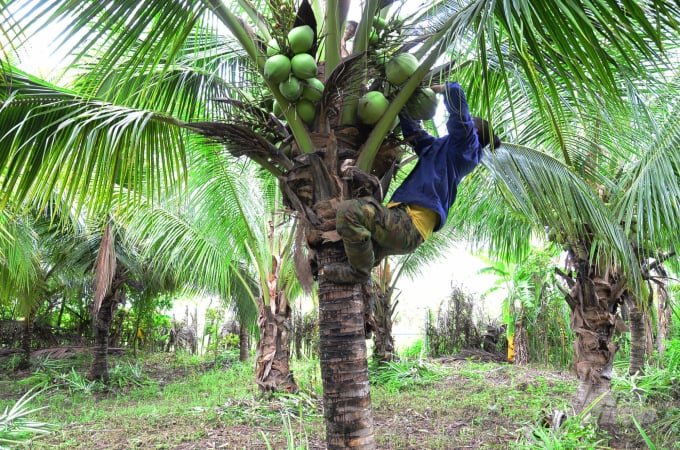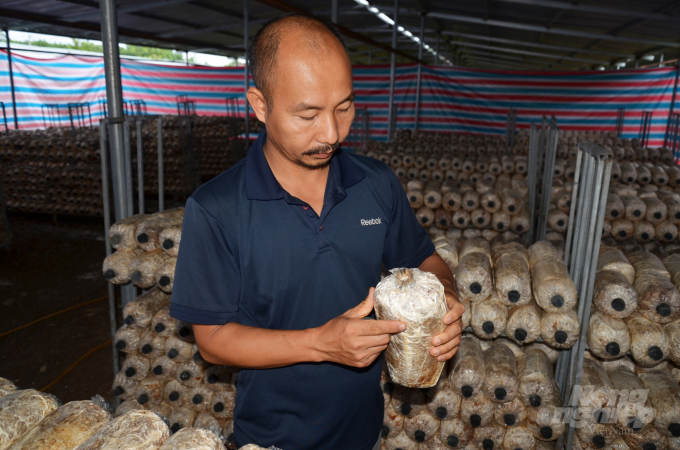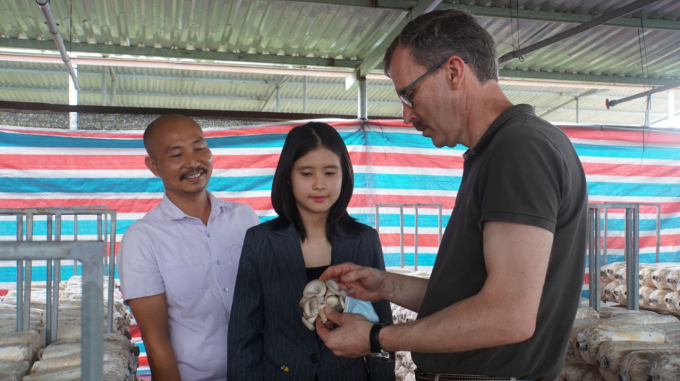May 31, 2025 | 22:10 GMT +7
May 31, 2025 | 22:10 GMT +7
Hotline: 0913.378.918
May 31, 2025 | 22:10 GMT +7
Hotline: 0913.378.918
After saying prayers, we happily ate raw foods like roasted cashews with pureed vegetables. It was deliciously pure because it was all organically produced in the home garden. We then leisurely had a cup of fragrant cinnamon tea amid the breezy cold weather.
Outside the window, the mountains and forests were vast and wide, and the birds were singing jubilantly. That peaceful scene is the daily life of Le Ngoc Anh, Director of TOTA Science and Technology Co., Ltd - the owner of a special ecological farm in Ea Po commune, Cu Jut district, Dak Nong province.

The delegation of Duchateau Koen - First Counselor, Head of Development Cooperation Department of the Delegation of the European Union to Vietnam visited the farm. Photo provided by the character.
A worker whose nickname is Big gave me a walk around the second garden in the Suoi Tre village. Sometimes he would climb to the top of the coconut to pick a few fruits, use a knife to cut the head, and we would drink right under the tree. The other time we saw right at the foot a ripe pineapple, so he peeled and then we sat down to eat on the spot. Just like that, and soon my stomach became full even though my eyes were still full of hunger, but I had to return to the first garden in Nam Tien village. The top is the rooftop solar power, the bottom is the floor with layer after layer of bags of mushrooms lined up neatly like books on a shelf.
Le Ngoc Anh said, “There are three things people want in the city: A good job, a good hospital and a good school, but my family has no need for that because we have taken the initiative in work and chosen a natural, self-care lifestyle.”
After searching in many provinces, from a predestined encounter thanks to a visit to a friend's house in the Central Highlands, Le Ngoc Anh and his wife were then fascinated by the land here with stretching hills, forests, waterfalls, and streams. The people were gentle, and their culture was imbued with identity. They decided to buy 3.2 ha of land, quit their job while he was a branch manager of a bank in Ho Chi Minh City and she was a teacher, to work on the farm. It was the end of 2019.

Big was picking pineapple to treat the guess. Photo: Duong Dinh Tuong.
Nam Tien was a poor village located in the poor commune of the second poorest province in Vietnam - Dak Nong. The land here was also very bad, full of rocks and stones. The old gardener planted rubber and pepper inefficiently, so when they first bought the land, Le Ngoc Anh consulted agricultural experts on how to improve the soil. He then chose the Japanese organic farming style.
“We bought agricultural waste such as straw and tree branches to make mushrooms, and then from mushroom residues, rice husks, and organic waste, we mixed with microbial products to make compost, forming a non-disposable cycle of production without leaving anything to waste. Our mushroom output in 2021 reached approximately 5 tons of dried, 30 tons of fresh, and the total revenue was over VND 1 billion. This year, however, the figures suffered a decrease due to black beetles flying back to wreak havoc. It’s just that we are determined to follow organic standards, so we don't spray chemical pesticides.
On another farm, bought later with more than 5 ha in Suoi Tre village next door, there is very good volcanic lava black soil, so we are currently renovating to get the Japanese organic certificate. In June 2022 a delegation of Japanese experts came to provide guidance on soil improvement to treat chemical residues. We are planting legumes next to fruit trees such as longan, coconut, avocado. We do not spray herbicides but only cut grass to cover the tree stump so that they can become fertilizer or moisture preserve. There is a doctor who is a lecturer at the University of Science who comes to study the soil to help us understand its conditions. It may take about 3-5 years to create clean, standard land," Le Ngoc Anh said.

Le Ngoc Anh checking a bag of mushrooms. Photo: Duong Dinh Tuong.
“If you had to choose again, would you choose to live in the middle of nature like this?” I asked. Le Ngoc Anh immediately replied, “I sure do. Normally people leaving the city to reach the forest had the thought of loving nature at first, but later they could not adapt to the uncomfortable living environment. The next problem lies in the question of where do they get the money to live this kind of life.”
His family determined from the very beginning to self-supply food to minimize the need to buy things outside. “This was also a way to ensure our health, not to worry like when we were in the city, having to be close to a good hospital and easily getting into contact with health care conditions. We also have faith that clean agriculture, organic farming will be successful. If you persevere and keep following it, surely the day of success will not be far away.”

Le Ngoc Anh (leftmost) and his daughter Le Cam Ha introducing mushrooms to Duchateau Koen, First Counselor of the Delegation of the European Union to Vietnam. Photo provided by the character.
He continued, "During that 3-5 year waiting period, it's not necessarily true that organic farmers are the ones to suffer. During the recent Covid-19 pandemic, I saw people in the city struggling because of a lack of food. Even now when the door of trade is open again, they have the money, but it is still not certain that they can buy clean and quality food.
“And in terms of environment, it is impossible to compare the city environment with the countryside or mountains where there is a lot of fine dust but lack of oxygen because there are few trees. Another misfortune is that city people are still reeling in a game of making money and raising children. entertain, travel, but that vacation is still in the urge. And we are here every day is a day off, every day is a working day, every day is a study day. If you return to nature, nature will give you everything."
But looking back at the state of the village, it pained Le Ngoc Anh to see this place full of old people and children. Young people left the land to work as workers or go to the city to do freelance. Land and property were abandoned. This led him to ignite the idea of reviving Suoi Tre village into a Japanese-style ecological village. “Many households would jointly produce organic agriculture since farmers here had already used to farming. The only change they needed was the farming method. The houses in the village would be made of wood and bamboo, small and beautiful with green fences. In the village premises, trees will be planted in three layers of canopy: trees for timber, trees for fruit and trees for seeds, medicinal herbs, and vegetables.”
When the delegation of Duchateau Koen - First Counselor, Head of the Development Cooperation Department, Delegation of the European Union to Vietnam, visited the farm, Le Cam Ha - the eldest child of his family introduced all activities of the company as well as development orientations in fluent English. She answered every question of the delegation with confidence. She only consulted her parents when there was something she didn't know. She demonstrated capabilities that exceeded being just a simple translator. That performance triggered my curiosity. I wanted to find out how she came to be, especially when Le Ngoc Anh said that both of his children had been studying at home for 6 years now, without going to school, and the teacher is none other than him and his wife.
To be continued…
Translated by Samuel Pham

(VAN) Several scientists and farmers are experimenting with soil treatment in some key durian-growing regions such as Cai Lay (Tien Giang), Dak Song, Gia Nghia, and Dak R’lap (Dak Nong).
/2025/05/25/4127-3-073637_820.jpg)
(VAN) Thanks to the promotion from an FAO-implemented project, vegetable production in greenhouses in Moc Chau has seen strong development, from 1.5 hectares in 2021 to nearly 50 hectares in 2024.

(VAN) FAO has recently supported USD 140,000 to implement the project 'Risk mitigation human-animal interface risks through disease control initiatives in pig farming.'

(VAN) The People's Committee of Tra Vinh province has approved an adjustment to the investment policy for the Green Hydrogen Plant project, increasing its area to approximately 52.76 hectares.
![Reducing emissions from rice fields: [2] Farmers’ commitment to the soil](https://t.ex-cdn.com/nongnghiepmoitruong.vn/608w/files/news/2025/05/05/dsc08881jpg-nongnghiep-140632.jpg)
(VAN) Clean rice cultivation model in Thuong Tan commune, Bac Tan Uyen district, is assisting local residents in achieving sustainable agriculture by substantially reducing costs, increasing productivity, and protecting the environment.

(VAN) At the conference to disseminate Resolution No. 68, AgriS introduced its digital agricultural ecosystem and reaffirmed its commitment to accompanying the Government in promoting private sector development and sustainable agriculture.

(VAN) 'Blue Ocean - Blue Foods' initiative is designed to restore marine ecosystems and establish sustainable livelihoods for local communities by cultivating a minimum of 1,000 hectares of cottonii seaweed in the first three years.